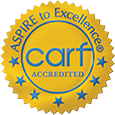What can I be doing while my loved one is in treatment to help him stay sober when he returns?
Participation in family groups is highly recommended for the immediate family.
Here we find the understanding and support to discuss our emotions surrounding the way we have been living. Through educational family groups we gain a better understanding and the tools to move forward to a healthier way to live and support those we love, including the addict.
As AA is to the addict, Alanon is to the loved one of an addict. Getting involved with other family members/ loved ones and learning how they changed, having the support of the 12-step community can give us strength to heal our own pain and in turn those we love.
We recommend you go to the Al-anon LA website to select a local meeting. You may also attend Al-anon family and teen groups.
What are the chances of success for my loved one and our family?
As reported by the Substance Abuse and Mental Health Services Administration (SAMHSA), there has been a dramatic increase in the adoption rate of recovery-oriented care and recovery support systems in recent years.
SAMHSA has developed a four-part definition that defines a life in recovery:
- HEALTH: making the right, healthy choices that support physical one’s overall health and well-being.
- HOME: stability and safety at home.
- PURPOSE: Having the right attitude, job, mentorship, independence to be a participating member of society.
- COMMUNITY: Building a strong infrastructure that includes love, friendship and social support, driving hope in one’s life.
Indeed, “hope,” a belief that these challenges and conditions can be overcome, is the very foundation of recovery.

Akashdeep S. Gil, M.D., Healthcare Director
The statistics when it comes to addiction and recovery can be discouraging, but what we have seen and experienced is that millions of addicts willing to honestly face their issues, and with the right help recover everyday.
Our abstinent, 12-step approach with the ongoing support early on, when the person is ready, works. Millions of people have new, purposeful places in society free from alcohol and drugs.
With your help, and their commitment, this may be your loved ones time.
What are family groups and why is family therapy important?
Addiction is a family disease. When one component of the family system is sick, then the whole family is affected. Many family members do not know how to provide help and support for their loved one, which can lead to unmanageable levels of stress at home.
Pax House family groups provide both a deeper understanding and insight into the disease, and at the same time, impart the skills and techniques family members can use to support an addict through recovery. Difficult issues of co-dependence, abuse and personality conflict can be discussed in the safe and supportive environment of a family group facilitated by our staff. In this way, families can begin to heal the broken relationships that may have contributed to the development of the addiction in the first place, and work towards developing a healthier home environment for all family members.

Dr. Yesayan, Ph.D., Psychologist
Pax House offers family groups on a weekly basis for the immediate family members of clients at our facility. Depending on the situation, this might include spouses, parents, siblings and children. In some circumstances, other family members or loved ones might also be involved.
How can I help my loved one commit to treatment?
We know that to stand by and watch your loved one hurt themselves and destroy their lives is extremely painful. Sometimes they even make sincere apologies, only to get worse the next time they use. This is the progressive cycle of alcoholics and drug addicts. There can be a great amount of denial from all sides, but sadly, you know you are losing them to their addiction.
Sometimes, those close to the addict can have success at breaking the cycle by initiating an intervention. The intention of the intervention is to draw a line in the sand, and in a very loving way let the addict know how you feel. The impact can be so significant that it nudges the addict into treatment.
If you feel that an intervention can help your situation, Please contact one of our experienced staff members at Pax House to help you make this happen.
How can I help my loved one?
Addiction is heartbreaking and confusing for the loved ones of an addict. By reading this today, you have taken an important step forward for your loved one, and yourself, by seeking professional help.
Many family relationships are the first casualties of alcohol or drug abuse. Some families enable the addiction, some dysfunctional family relationships contribute to the development of the addiction. The feeling of being powerless to help those suffering from addiction is overwhelming.

Dr. Sarah Wahab, Psy.D, Clinical Director
Please feel free to speak confidentially to one of our staff mebers about your situation and how we can help.
If my problem is drugs, can I continue drinking?
“Alcohol is a drug, and it is recommended that an addict seeking recovery stop the use of all drugs. Pax House teaches abstinence based treatment. The issue isn’t ‘which drug hurts me and which does not,’ it’s that I can’t be comfortable in my own skin without SOMETHING mind altering to fix the way I feel. There is more to it than that, but in a nutshell it’s not about which drug we are using, it’s about the need to use something – anything – to feel comfortable.”
At Pax House we will help you embark on your personal journey of transformation. This journey begins by removing all of the harmful, destructive substances within you, while you start to learn about the underlying causes that you have been trying to medicate through your use.
What Happens After Treatment?
We also have Alumni and Aftercare programs to offer continued support for our clients in their journey to recovery. We recognize that alcoholism and drug addiction are incurable diseases, and through experience, we know they can be managed with the right set of skills, knowledge, support and structure. Having shared in a common problem, working to change gives us all a powerful connection to one another and a sense of purpose to strive to help those who suffer the same way.
What Happens During Treatment?
Phase One: Detox
Long term alcohol and/or drug use takes a very heavy toll on the body, so before recovery can begin it is imperative to address the physical effects of active addiction. All of our clients start treatment with a 24-72 hour detox period where each individual is medically monitored to ensure safety during this important first phase of physical detox. You will be monitored around the clock to ensure the safest withdrawal and to prevent any possible medical complications.
Some of our clients may require medically-assisted detox. This includes using specialized medication to wean a person off a substance. This is most commonly used with opiate withdrawal. Suboxone and methadone are the most common medications used for opiate withdrawal. They act similarly to opioid drugs but have a longer half-life, meaning they do not require as many doses as the other drugs. The dosage is lowered over time, so that a person does not experience withdrawal. There are also drugs that assist in safely tapering off alcohol dependency.
We want to ensure that you are stabilized and healthy enough to participate in our program, at a level where you will be able to concentrate fully on learning about your disease, understanding the underlying issues that led to its development, and gaining the skills and the strength necessary to overcome it. The length of the detox program will depend on your situation, but we ensure that each client has the appropriate level of detox necessary to take the first step in their journey to recovery.
Phase Two: Residential Treatment
As active alcoholics/addicts we have been trying to cope with life the only way we know how, and by the time we reach out for help our problems are piled up and we are overwhelmed. Our mission at Pax House is to help you discover and implement a new ‘design for living’ that we, and millions of other addicts have found. Freedom can be yours.
Once you are physically stable, we will be able to start the assessment period and begin to evaluate your specific needs: physical and mental health; types of substance use and/or dual addiction; family history, etc., to ensure you receive the best possible treatment plan to build a solid foundation for lasting recovery.
At Pax House our objective is to help you get what you need to begin your journey, with the tools you will require to rebuild your life and finally address your disease. For some, breaking the cycle is the only chance they have. Being in a safe, drug and alcohol free environment with like-minded people is imperative to really focus on your problem, away from the triggers, and stressors of old environments that contributed to your addiction formation. Immersed in a new, serene, safe and supportive setting, you can learn how to be sober and remain sober. At Pax House, we offer 30, 60 and 90-day treatment options as we know your individual need and life situation may be different from someone else. The length of stay is dependent upon you and your situation.
While your treatment program is individualized to suit your specific needs, the main treatment components remain the same. The foundation of the program is an abstinence based, 12-step disease model and continuum of care that has proven to be most successful for the millions of addicts who are living in recovery.
During your initial session with your primary counselor, you and your counselor will formulate an individualized treatment program that addresses your particular needs. During treatment, you will meet with your counselor on a weekly basis to discuss issues that have arisen during treatment, as well as to process specific assignments.
We know that ongoing, individual counseling sessions are an essential component of treatment for alcohol and drug abuse. Most of us get to treatment full of fear, anxiety, remorse and many other problems that need to be addressed, one on one, case by case. You might be diagnosed with mental illness such as depression or anxiety, or it might just be negative feelings or emotions brought about by low self-esteem, relationship problems, stress, external pressures, a traumatic event, or other negative experiences. If your mental health is not addressed alongside the addiction problems, then you may have a high risk of relapse. At Pax House, individual psychotherapy is the foundation of our treatment program.
Our residential treatment provides intensive treatment for substance abuse and addiction with 24-hour monitoring and care. The program at Pax House is highly structured. Recovering addicts follow a regular schedule and learn the positive benefits of routine in sobriety. The treatment is intensive, and your days are filled with individual and group counseling, education groups, therapeutic activities, and daily 12-step meetings. The facilities are entirely drug and alcohol free to ensure clients remain sober during the most challenging stages of early recovery.
Group Activities
Breaking the lonely isolation of active alcoholism/drug use and being with other sober people sharing in our common experiences and feelings, is the very foundation of recovery. At Pax House we offer varied groups, including process, educational and family groups. Process groups focus on addressing various shared issues, such as self-esteem, anger management or trauma, in a group setting with others undergoing a similar experience. Clients receive supportive feedback from their peers and have a safe environment in which to share and process certain feelings and emotions. A counselor advises the group. Education groups differ in that the main focus is to teach clients about alcoholism and addiction. It is done in an interactive setting where clients can ask questions and discuss certain issues. Family groups include the family members of the clients, where issues related to family dynamics are addressed.
The Amenities
Pax House provides a comfortable, supportive atmosphere in which to address the underlying issues that contributed to the development of the addiction. The beautiful surroundings of the foothills of the San Gabriel Mountains in Altadena, California provide the perfect setting for healing. Our house contains twelve beds for both men and women. Meals are prepared on-site by our very own resident chef from Le Cordon Bleu. Past residents all agree that the home-like surroundings and the supportive structure they found within, was a formative foundation of beginning to heal their inner damage and regain a new sense of peace and purpose.
What if I’ve Been Diagnosed with Other Illnesses/Co-Occurring Conditions?
In many cases substance abuse is the primary problem leading to mental health issues like hallucinations, depression or anxiety which can complicate their addiction treatment. A true diagnosis can not be determined until active addiction is halted and our team can determine the proper specialized, dual diagnosis treatment necessary for the individual to reach full recovery and avoid relapsing.
A generalized rehab treatment may not be enough for people suffering from unique issues and difficult circumstances. That’s why addiction treatment designed specifically for those with mental illnesses results in a better chance for full recovery, with the individual remaining sober long after completing their program.
Our residential rehab facilities offer the supportive environment and necessary tools for patients with a dual diagnosis to successfully face their individual challenges.
How Do I Pay for Rehab?
Pax House accepts most insurance plans for those who would like to enroll in our recovery program. The cost of treatment may be covered by full or partial payments depending on your individual insurance plan and the coverage they provide. It is necessary to determine the extent of your coverage through an insurance verification form prior to enrollment as benefits will differ according to each plan. Filling out an insurance verification form can help us find the extent of your coverage so that we can either accept your full payment up front or partial payments through your insurance benefits.
When a patient’s insurance does not cover the full payment, they can provide a deposit or co-payment if out of pocket maximums have not been met, or their insurance only offers limited coverage for our recovery services. If your insurance does not cover our services at all we can sometimes obtain a single case agreement with your insurance provider to cover the cost as you complete our recovery program. Private financing is also available.
At Pax House we work to ensure that those in need of recovery can afford our treatment and benefit from our services. Feel free to call us and let us recommend the right plan for you or your loved one.



